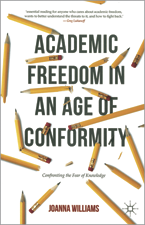
Joanna Williams. Palgrave Macmillan.
2016; 217 pp; ISBN: 978-1-13751-478-3.
By Len Findlay
As its title attests, this volume is deliberately confrontational. Joanna Williams names and deplores conformity as a damaging feature of the contemporary university. This conformity, she argues, leads to professorial self-censorship and various misguided, prudent, or plain cowardly retreats from the pursuit of truth in order to protect or appease a student body too delicate or slavishly partisan for its own good
The argument unfolds in three parts, the first offering some historical context for academic freedom as an Enlightenment ideal regularly attenuated, abandoned, or attacked in universities today. The second part of the book connects the decline of academic freedom to a loss of confidence in disciplinary knowledge (particularly in disciplines in the humanities and social sciences). The third part endeavours to expose critical theory as in reality an “uncritical” aversion to truth which feeds the levelling appetites and irresponsible inclusiveness of cultural studies, American studies, and post-modernism, while the demonizing of unfashionable knowledge and inconvenient truths is assisted by feminism in more thoroughly enforcing a shift from academic freedom to “academic justice.” Despite its fine sounding name, academic justice is for Williams little more than a pretext for silencing and self-censorship, which everywhere imperil where they have not already replaced the values of independent inquiry and open debate. As a consequence, the university is no longer that “marketplace of ideas” essential to the extension and regular revitalization of “the liberal project” and liberal democracy. The most serious threat to universities today is not posed by external forces but by on-campus progressives “researching rape or climate change, or those campaigning in support of Palestine.” Scholars of this type, it is claimed, offer a bad example to their students while refusing to those colleagues who do not share their views the right to dissent and debate.
Williams is clearly passionate about academic freedom. However, her concentration on the ultra-fractious United Kingdom and the hyper-partisan United States causes one to wonder whether the “age of conformity” is a gross exaggeration leading to even grosser mischaracterization and stereotyping of intellectual and artistic movements, disciplines, leading figures, and curricular and pedagogic change. This book would be more persuasive and useful if it took time to unpack the complexities of influential figures like Kant, Mill, Newman, Adorno, Eagleton, or Judith Butler. To align Newman, for instance, with liberalism without acknowledging his deep conservatism and the challenges and frustrations that underlie The Idea of a University is to cherry pick in a brazen way. The result of this strategic simplification is, unfortunately, to enable sweeping generalizations such as this: “It took many decades for the intellectual movement of the Enlightenment to have an impact on universities.”
In selling intellectual history short, Williams also does a disservice to her contentions about universities today. Timely admonition gives way to alienation, pessimism, and even self-loathing, while the almost total absence of Canada (and a wide range of countries from alarmingly long-lived imperial peripheries) bears witness to the chronic parochialism and self-absorption of too many British and American commentators on the contemporary university. Authoritarian and intolerant silencers are of course active across the world, but there is abundant and resourceful resistance to such silencing too. What would 10 years of Stephen Harper have accomplished without the work of CAUT, its member associations, and its allies in public sector and student organizations and the media? Why was the watering down of AUCC/UC commitments to academic freedom during the Harper years so disappointing and dangerous? Why does pedagogic authority still trump consumer sovereignty and brand loyalty. One reason is that, Williams’s arguments notwithstanding, solidarity is not the same as conformity, and no “age” (including the current one) can be as readily reified and homogenized as she attempts to do.
Len Findlay is the chair of the University of Saskatchewan Faculty Association and a former chair of CAUT’s Academic Freedom and Tenure Committee.